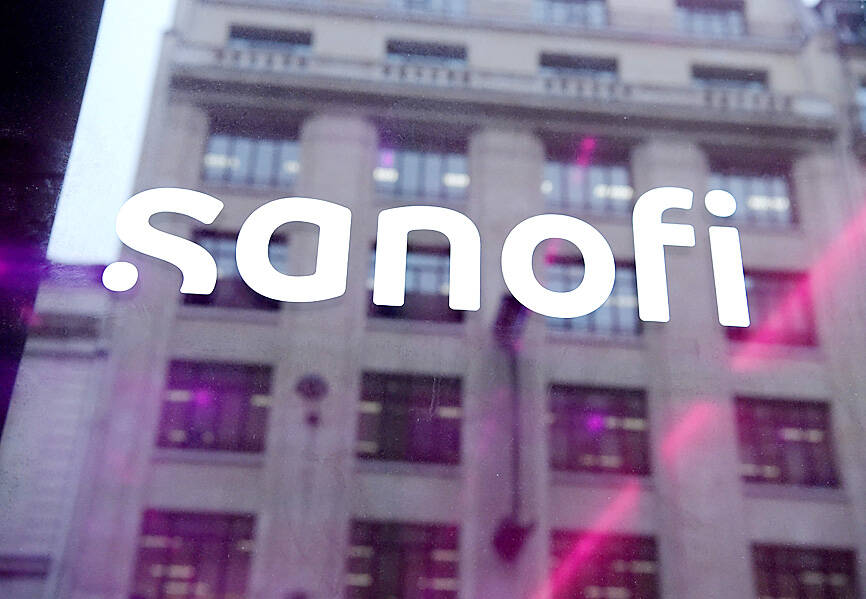Sanofi SA’s drug Dupixent succeeded in a late-stage trial for chronic obstructive pulmonary disease (COPD), raising the odds that the blockbuster would be the first biologic medicine cleared to treat the lung disorder.
Dupixent, which is already prescribed for asthma and some skin conditions, showed a 30 percent reduction in the rate at which patients’ COPD worsened compared with those who received a placebo during the stage-three Boreas trial, the company said in a statement yesterday.
The positive data could herald a new era of cutting-edge treatments for the life-threatening respiratory affliction and provide another major boost in demand for the French drugmaker’s lead therapy.

Photo: AFP
Still, Sanofi probably needs Dupixent to also perform well in the related trial, called Notus, before it can apply for approval, said Tim Anderson, an analyst at Wolfe Research LLC.
That study likely would not produce key data until next year.
This is the first time an antibody therapy has shown to be effective against COPD and follows stumbles from AstraZeneca PLC’s drug Fasenra and GSK PLC’s Nucala, Peter Welford of Jefferies said in a recent note.
In the trial, Dupixent improved people’s lung function and quality of life.
The results are “unprecedented and potentially paradigm-shifting,” Dietmar Berger, Sanofi’s chief medical officer, said in the statement.
Common among current and former smokers, among others, COPD damages people’s lungs and can cause persistent coughing and breathlessness, along with anxiety, depression and sleep disturbances.
In the US, about 300,000 people suffer from the type of COPD that was included in this trial, Sanofi said.
There have been no new treatment approaches approved for COPD in more than a decade, Sanofi said.
Sanofi has developed Dupixent with the US company Regeneron Pharmaceuticals Inc. The French company has a peak sales forecast of more than 13 billion euros (US$14.2 billion) for the drug, which does not include any potential revenue for treating COPD.
Some analysts are forecasting that Dupixent would bring in as much as 18 billion euros in sales by 2030.

DIVIDED VIEWS: Although the Fed agreed on holding rates steady, some officials see no rate cuts for this year, while 10 policymakers foresee two or more cuts There are a lot of unknowns about the outlook for the economy and interest rates, but US Federal Reserve Chair Jerome Powell signaled at least one thing seems certain: Higher prices are coming. Fed policymakers voted unanimously to hold interest rates steady at a range of 4.25 percent to 4.50 percent for a fourth straight meeting on Wednesday, as they await clarity on whether tariffs would leave a one-time or more lasting mark on inflation. Powell said it is still unclear how much of the bill would fall on the shoulders of consumers, but he expects to learn more about tariffs

Meta Platforms Inc offered US$100 million bonuses to OpenAI employees in an unsuccessful bid to poach the ChatGPT maker’s talent and strengthen its own generative artificial intelligence (AI) teams, OpenAI CEO Sam Altman has said. Facebook’s parent company — a competitor of OpenAI — also offered “giant” annual salaries exceeding US$100 million to OpenAI staffers, Altman said in an interview on the Uncapped with Jack Altman podcast released on Tuesday. “It is crazy,” Sam Altman told his brother Jack in the interview. “I’m really happy that at least so far none of our best people have decided to take them

PLANS: MSI is also planning to upgrade its service center in the Netherlands Micro-Star International Co (MSI, 微星) yesterday said it plans to set up a server assembly line at its Poland service center this year at the earliest. The computer and peripherals manufacturer expects that the new server assembly line would shorten transportation times in shipments to European countries, a company spokesperson told the Taipei Times by telephone. MSI manufactures motherboards, graphics cards, notebook computers, servers, optical storage devices and communication devices. The company operates plants in Taiwan and China, and runs a global network of service centers. The company is also considering upgrading its service center in the Netherlands into a

NOT JUSTIFIED: The bank’s governor said there would only be a rate cut if inflation falls below 1.5% and economic conditions deteriorate, which have not been detected The central bank yesterday kept its key interest rates unchanged for a fifth consecutive quarter, aligning with market expectations, while slightly lowering its inflation outlook amid signs of cooling price pressures. The move came after the US Federal Reserve held rates steady overnight, despite pressure from US President Donald Trump to cut borrowing costs. Central bank board members unanimously voted to maintain the discount rate at 2 percent, the secured loan rate at 2.375 percent and the overnight lending rate at 4.25 percent. “We consider the policy decision appropriate, although it suggests tightening leaning after factoring in slackening inflation and stable GDP growth,”